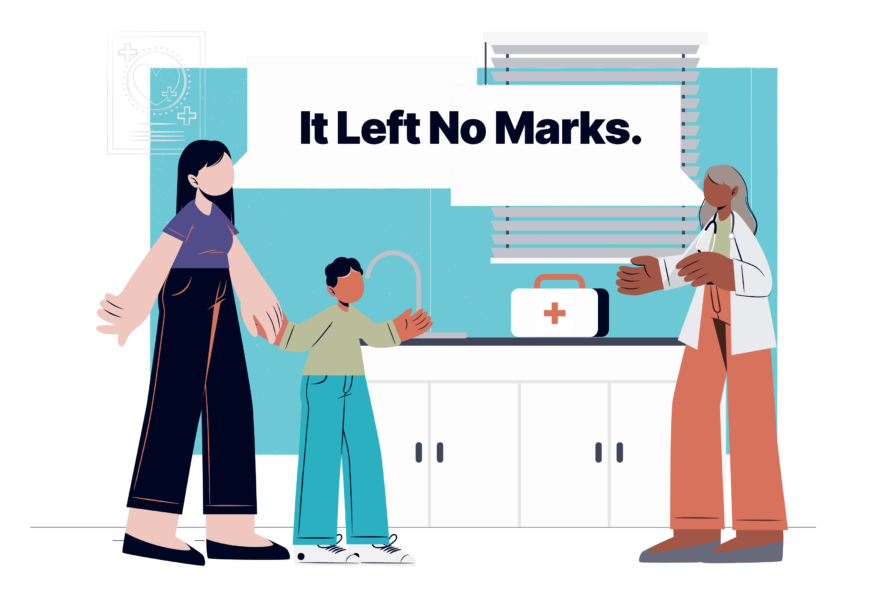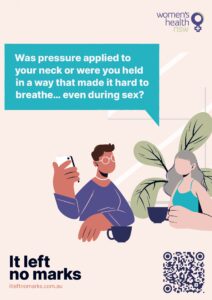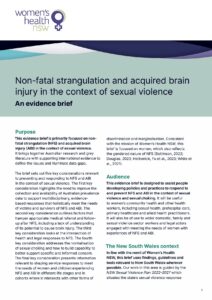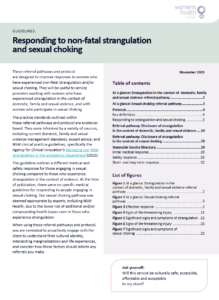
There has been an increased focus in NSW on improving acute care for victims and survivors of non-fatal strangulation. Not all women experiencing strangulation present at an emergency department in the days following the event. Some women disclose strangulation months to years after the event, often to counsellors and caseworkers in community health settings. Some women have experienced repetitive incidents of strangulation or engaged in sexual choking practices over long periods of time, and show signs and symptoms associated with acquired brain injury. The Pathways Project was designed to help connect these women to appropriate healthcare.
General Practitioners (GPs) are the main coordinating point for addressing the health needs of women experiencing strangulation, as explained by Dr Frances Chen in this HealthEd podcast. This clinical article by HealthEd also discusses acute and chronic presentation and management of non-fatal strangulation in primary care settings.
When GPs work in tandem with women’s community health centres, we can ensure everyone has referral pathways, protocols and services at their fingertips to provide women with useful and responsive healthcare following strangulation. This might include sending the woman to the emergency department for recent or severe cases, or to neurology, psychology, brain injury clinics, or other allied healthcare providers to support her ongoing recovery process and long-term health needs. Or it might mean connecting a woman who presents with these issues at your practice with her local women’s health centre to help her manage the emotional and psychosocial impacts of strangulation.
As a GP, it also means looking after your own health and wellbeing. Healthcare providers are not immune to vicarious trauma. The RACGP’s The White Book has a range of suggestions to help you stay safe and healthy: Keeping the health professional safe and healthy
Health promotion
GPs also have a role in health promotion. This can be done personally, by familiarising yourself with key messages about sexual choking or by watching this HealthEd presentation, and through the sharing of resources with your patients, like this Women’s Health NSW video about strangulation. Other resources you can share with your clients include these print-ready promotional resources designed to connect women to this website and the information it contains for women about strangulation and sexual choking: It Left No Marks postcard, poster and wallet card
Working with men
If you get disclosures about using violence from men in your service provision, we have created this video showing how you might devise health promotion messages about sexual choking that are suitable for men who use power and control in their relationships.
The evidence
This Women’s Health NSW evidence brief brings together Australian research and grey literature with supporting international evidence to define the issues and illuminate data gaps relevant to preventing and responding to NFS and acquired brain injury (ABI) in the context of sexual violence. The brief covers factors that hamper appropriate medical referral and follow-up after NFS, including a lack of understanding of its potential to cause brain injury. It also highlights the need to improve Australian prevalence data to support multidisciplinary, evidence-based responses that holistically meet the needs of victims and survivors. Non-fatal strangulation and acquired brain injury in the context of sexual violence: An evidence brief
Medical case notes and record keeping
Developed in conjunction with Women’s Legal Service NSW, this 2024 Ask Lois webinar provides information about how to ensure medical case notes and record keeping can best support women who opt to pursue legal or compensatory outcomes following strangulation: Ask Lois webinar on strangulation. Women’s Legal Service NSW have also produced a separate webinar on subpoenas and record keeping that you can access here: Ask Lois webinar on subpoenas and case notes
Guidelines: Responding to non-fatal strangulation and sexual choking
These Guidelines were designed to improve service responses to women with experiences of non-fatal strangulation, and sexual choking. They are being used in women’s health centers and other services across NSW. The Guidelines explain the circumstances under which women may be referred to healthcare services, and the things the service provider has considered in making that referral. Guidelines: Responding to non-fatal strangulation and sexual choking
Further training
Women’s Health NSW have created three short training videos to improve responses to women who have experienced non-fatal strangulation and who may be suffering from an acquired brain injury. They will be useful to healthcare providers who encounter women who have experienced strangulation and brain injury in the context of domestic, family, and sexual violence, or with women who engage in sexual choking. https://www.itleftnomarks.com.au/resources/an-introduction-to-non-fatal-strangulation-and-acquired-brain-injury/
Monash University offers a three-unit course for healthcare professionals that is designed to improve recognition and appropriate responses to adult disclosures of sexual violence. The course, Recognising and Responding to Sexual Violence in Adults, is delivered in online modules over the course of six weeks and covers NFS in the second training module. It is delivered by the Victorian Institute of Forensic Medicine as Continuing Professional Development (CPD) training and accredited by multiple professional bodies, including the Royal Australian College of General Practitioners (RACGP) and the Australian College of Nursing (ACN). https://www.monash.edu/medicine/sphpm/study/professional-education/responding-to-sexual-violence
Further reading
Australian Journal of General Practice. (2022). ‘I thought I was About to Die’: Management of Non-fatal Strangulation in General Practice. https://www1.racgp.org.au/getattachment/d0b73b93-f576-49ee-987a-3df6142e9ea8/Management-of-non-fatal-strangulation.aspx
Victorian Institute of Forensic Medicine. (2022). It’s Never OK [VIDEO]. https://www.vifm.org/non-fatal-strangulation/
Agency for Clinical Innovation (2022): Managing non-fatal strangulation in the emergency department. https://aci.health.nsw.gov.au/__data/assets/pdf_file/0005/750344/ACI-Non-fatal-strangulation-clinical-practice-guide.pdf
Australian Social Work. (2024). Enabling Emergency Department Staff to Support Domestic Violence Victims of Strangulation. https://doi.org/10.1080/0312407X.2024.2399562
The Royal Australian College of General Practitioners. (2023). Responding to non-fatal strangulation: What you cannot see [WEBINAR]. https://soundcloud.com/nswact-racgp/responding-to-nfs
The Royal Australian College of General Practitioners. (2022). Abuse and violence: Working with our patients in general practice. https://www.racgp.org.au/getattachment/4ab6102c-67d9-4440-9398-a3ae759164ef/Abuse-and-violence-Working-with-our-patients-in-general-practice.aspx
HealthEd. (2024). Non-fatal strangulation detection and management. https://www.healthed.com.au/clinical_articles/non-fatal-strangulation-detection-and-management/
HealthEd. (2025). Women’s Health: When to suspect and screen for non-fatal strangulation [PODCAST]. https://www.healthed.com.au/podcasts/when-to-suspect-and-screen-for-non-fatal-strangulation/
HealthEd. (2025). Supporting victims of sexual assault within a primary care setting [PODCAST]. https://www.healthed.com.au/podcasts/supporting-victims-of-sexual-assault-within-primary-care-setting/
Mullin, S. & Hardiman, L. (2025).The characteristics and circumstances of fatal interpersonal strangulation in Australian adults. https://journals.sagepub.com/doi/10.1177/08862605251321001
Women’s Health NSW. (2024). Sexual choking: An emerging health issue [WEBINAR]. https://www.itleftnomarks.com.au/resources/healthed-medical-update-2024/
Sharman, L.S., Fitzgerald, R. & Douglas, H. (2024). Prevalence of Sexual Strangulation/Choking Among Australian 18–35 Year-Olds. https://doi.org/10.1007/s10508-024-02937-y
Conte, I., Sharman, L. & Douglas, H. (2025): Choking/Strangulation During Sex: Understanding and Negotiating “Safety” Among 18-35 Year Old Australians https://link.springer.com/article/10.1007/s10508-025-03097-3
Women’s Legal Service NSW (2019): “When she talks to you about the violence”: A toolkit for GPs in NSW https://www.wlsnsw.org.au/newly-updated-gp-toolkit/
Medicare Benefits Schedule Online (2023): Introduction of new Level E consultation items lasting 60 minutes or more https://www.mbsonline.gov.au/internet/mbsonline/publishing.nsf/Content/Factsheet-intro%20of%20lvl%20E
